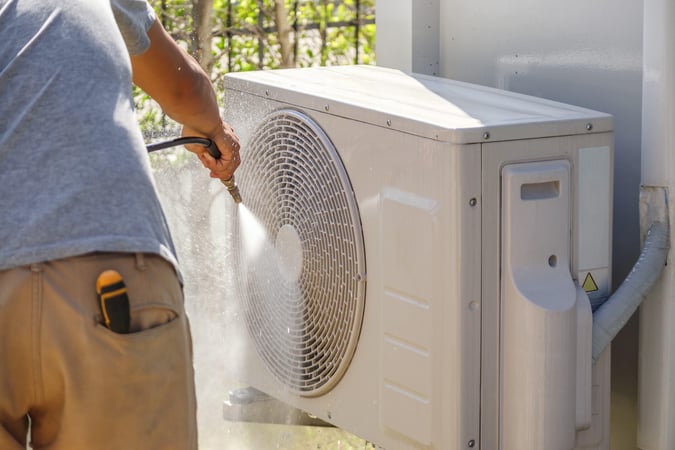
The Compliance Challenge in HVACR Contracts
Compliance with HVACR services is no small feat. Engineers and contractors must adhere to many safety standards and environmental regulations, such as European F-gas regulations. These standards ensure that harmful refrigerants are managed responsibly, equipment is maintained optimally, and safety protocols are rigorously followed.
Key Compliance Challenges:
- Tracking and managing a large volume of service records and compliance certificates.
- Ensuring that all tasks are carried out according to regulatory guidelines.
- Minimising human errors in documentation and ensuring consistent record-keeping.
For HVACR companies, the repercussions of failing to meet compliance requirements can be severe, including substantial fines, damage to reputation, and even legal action. This underscores the critical role of real-time reporting, making it not just a convenience, but a necessity.
The Power of Real-Time Reporting for Compliance:
Real-time reporting is not just a tool; it's a powerful asset that empowers HVACR companies to take control of their compliance management.
HVACR companies can drastically improve their compliance management with real-time reporting features integrated into FSM software. Engineers can log critical data on the spot, from refrigerant usage to safety checks, and immediately update the central system. This ensures all necessary compliance information is accurate, up-to-date, and readily accessible.
How Real-Time Reporting Enhances Compliance:
- Instant Documentation: Engineers can complete real-time compliance forms and safety checklists, reducing the risk of missed or inaccurate entries. For example, Joblogic's software enables the automatic generation of F-Gas compliance certificates linked to the job record, making them easily retrievable during audits.
- Automated Alerts: Managers can set up automated reminders for compliance-critical tasks, such as equipment inspections or regulatory updates, to ensure that deadlines are met.
- Digital Signatures and Verification: The software allows for digital sign-offs, verifying that tasks have been performed to standard. This adds an extra layer of accountability and legal defensibility.
By automating and digitising compliance processes, HVACR businesses can significantly lower non-compliance risk while boosting operational efficiency.
1. Ensuring Accountability Across the Workforce
Accountability is crucial in HVACR contracts. Managers must know that technicians are completing work correctly and on schedule, and clients must trust that the job is handled with due diligence. Real-time reporting fosters a culture of transparency and responsibility, allowing for better oversight and management of tasks.
Features That Drive Accountability:
- Live Job Tracking: Managers can monitor the status of service jobs as they happen. If a technician encounters an issue or delays, it can be immediately communicated and addressed. This ensures that engineers remain accountable for their time and work quality.
- Engineer Performance Metrics: HVACR companies can track key performance indicators (KPIs) such as job completion rates, first-time fix percentages, and adherence to compliance protocols using dashboards and reporting tools. This data can be used for performance reviews, training needs assessments, and recognition of high achievers.
- Customer Visibility: Clients also benefit from real-time reporting. They can access updates about the status of their service contracts, view compliance documentation, and even receive automated notifications about completed work. This level of transparency builds trust and reinforces accountability throughout the service relationship.
2. Reducing Human Error Through Automation
Manual processes are often riddled with opportunities for mistakes, such as forgotten entries, misplaced paperwork, and illegible handwriting. Real-time reporting solutions virtually eliminate these issues by automating data capture and validation.
Key Automation That Reduce Error:
- Pre-Filled Compliance Forms: Joblogic allows for customisable, pre-filled forms based on job type and regulatory requirements. This means that engineers have fewer fields to fill manually, reducing errors and speeding up data entry.
- Automatic Data Syncing: Any updates made in the field sync immediately with office systems, ensuring that no data is lost and compliance records are always up to date. This automation also helps keep clients informed with accurate maintenance and repair work records.
With less time spent on paperwork, engineers can focus on delivering high-quality service, and managers can rest assured that compliance data is error-free and comprehensive.
3. Real-Time Reporting: Empowering Data-Driven Decision Making
Real-time reporting improves day-to-day operations and lays the foundation for strategic, data-driven decision-making. HVACR managers can analyse trends in compliance data to spot recurring issues, identify potential risks, and implement preventive measures.
Benefits of Data-Driven Management:
- Improved Resource Allocation: By understanding which jobs or types of equipment require more frequent attention, managers can allocate resources more efficiently and reduce unnecessary site visits.
- Predictive Maintenance Opportunities: Leveraging data from real-time reports allows HVACR companies to shift from reactive to predictive maintenance, addressing potential failures before they occur. This not only improves system reliability but also enhances customer satisfaction.
- Enhanced Financial Oversight: Through streamlined operations, managers can better understand the financial impact of compliance-related activities, helping them budget more effectively and identify cost-saving opportunities.
4. Elevating Client Relationships with Transparency
In an industry where trust is paramount, offering clients visibility into service operations can set HVACR companies apart. With real-time reporting tools, clients gain access to a portal to review job progress, compliance documentation, and performance metrics of their service provider.
Customer Benefits:
- Proactive Updates: Clients receive notifications when a technician is en route, work is completed, and compliance forms are ready for review.
- Comprehensive Reports: Clients can download or view detailed service reports anytime, including maintenance logs and compliance checks. This level of transparency builds confidence in the service provider and strengthens the client relationship.
5. Conclusion
Real-time reporting tools are invaluable in the HVACR industry, where every second counts and compliance is non-negotiable. They streamline operations, improve efficiency, and ensure that every job is performed with full accountability and transparency. By integrating such technologies, HVACR companies can elevate service standards, safeguard against regulatory risks, and foster stronger, trust-based client relationships.
Ready to boost your compliance and accountability with cutting-edge real-time reporting tools? Book a demo with Joblogic today and discover how our software can transform your HVACR service contracts into efficient, compliant, and fully accountable operations.